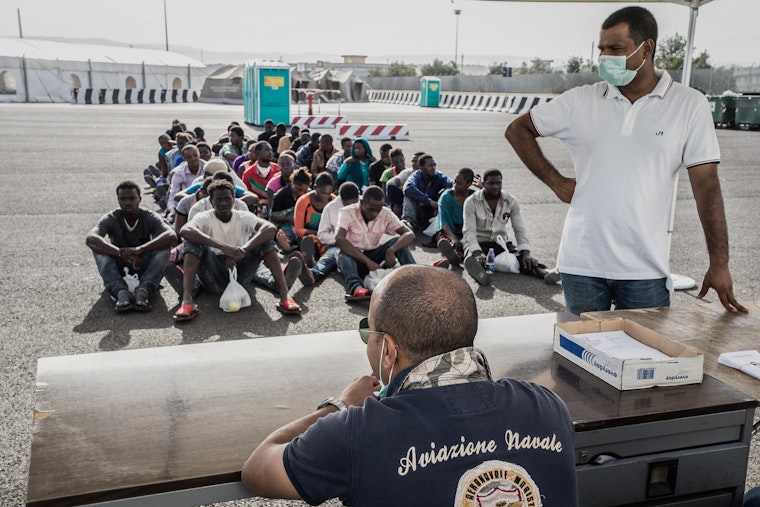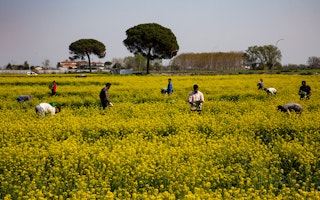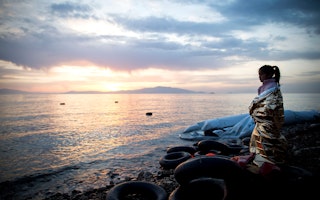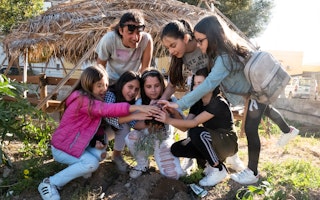A Bid for Greater Transparency on Refugees
By Gabriella Guido

Today, on World Refugee Day, we have the chance to direct the public’s attention towards the needs of the countless migrants risking their lives to flee violence and persecution back home. In Italy, one of the first destinations for many refugees entering Europe, transparency at migrant detention and identification centers is a particular problem that deserves our focus.
Civil society and media have very limited access to Italy’s detention and identification centers, leaving those centers vulnerable to potential mismanagement and abuses by the authorities working within their walls. For instance, in August 2015, 69 Nigerian teenagers who had been victims of trafficking and abuses in Libya landed in Sicily and were taken to the identification center in Rome. Without any legal assistance, they were told they would have to return to their home country. Ultimately, a legal campaign driven by LasciateCIEntrare managed to reverse this decision for most of them.
To help prevent situations like this, we are bringing civil society representatives, journalists, and politicians into detention, expulsion, and identification centers throughout Italy. In order to get access, we have to make an official request to the local authority where the facility is located, which then asks the Ministry of Interior for authorization.
Our goal is to shine a light on the inner workings of these centers, and foster transparency around the conditions in which migrants are being detained. This is essential to ensuring that Italian law, international treaties, and human rights are being respected. Since the Balkan route for refugees was closed, Italy has once again become Europe’s main welcoming country, with more than 20,000 migrants arriving since the beginning of this year. This makes it even more important that the system in Italy is functioning as effectively and humanely as possible.
LasciateCIEntrare launched in 2011 with a campaign against a law preventing journalists from entering identification and expulsion centers. Free movement of the press is written into the Italian Constitution, and as a result of our success in getting the anti-press law banned, our visits to these centers have uncovered abuses, human right violations, and mismanagement of public funds. As the migrant crisis evolves, we will continue this fight for respect of the rights of migrants.
Our latest concern is the emergence of “hotspots.” Under pressure from the European Union to reinforce the continent’s southern border and stop the flow of migrants, Italy set up these legal gray zones. Hotspots are buildings or camps where newly arrived migrants are taken to be fingerprinted and interviewed. Often people are effectively detained there, though officials resist calling the camps detention centers.
Here, official procedures are vague—arriving migrants, who should only remain in the centers for a maximum of 72 hours, sometimes stay for up to two months, and there is heavy police presence. Lawyers, journalists, and civil society representatives are not allowed on the premises. There are currently four hotspots in Italy, and two more are planned for this summer. What’s worse, the authorities are exploring the idea of locating these hotspots directly on the boats rescuing migrants in the Mediterranean, processing them at sea even further from the eyes of civil society and the public. To do so would go against the most basic international norms and human rights standards.
Today, the European Union is pressuring Italy to keep the door to Europe shut at all costs. The space for lawyers and civil society to monitor abuses and support migrants is almost nonexistent. We need to build a truly transparent and welcoming system to receive migrants, and ensure public money is properly spent. The welcoming system is the first step towards inclusion for migrants. Well managed, it could do wonders in addressing the current migration crisis in Europe.
LasciateCIEntrare is a grantee of the Open Society Foundations.
Gabriella Guido is a coordinator for LasciateCIEntrare.


